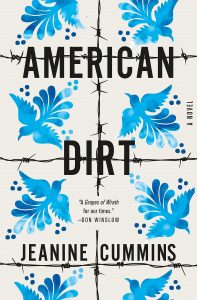 Published by Flatiron Books 21 January 2020
Published by Flatiron Books 21 January 2020
400pp, hardback, $27.99
Reviewed by Elsbeth Lindner
A popular novel about fleeing Mexican drug savagery in the hopes of safety and a new life in the US? It could be soapy and sentimental (or, these days, even science fiction) and moments of Cummins’ novel are, but the majority of the time her tale of cruelty, terror and desperation is a suspenseful, compelling read that imagines itself memorably into the relentless dangers and deprivations of the immigrants, especially the women and children, running from their homes.
The story opens with a massacre, the mowing down of sixteen members of a single family, all related to Lydia and her eight-year-old son Luca who are the only survivors. Gone are Lydia’s mother and her beloved husband Sebastian, a journalist whose latest expose of a vicious drug cartel leader has brought these reprisals down on all their heads.
The twist is that the cartel leader, Javier, is a friend of Lydia’s, a man who has visited her often in her bookshop, shared his own poetry and his favorite books, and opened his soul about his feelings for his family and her.
Bereft, contaminated and obscurely guilty, Lydia’s only survival option now is to take Luca and walk out of her previous life, taking merely whatever she can grab from the crime scene. No one can be trusted, not the police nor any passing stranger, shopkeeper or hotel receptionist, any of whom might be an informant, on the cartel’s payroll.
Thus begins a journey across Mexico, riding buses and later the tops of goods trains – known as La Bestia, the beast, where injuries and fatalities are frequent. Their company is other strangers of all ages and nationalities whose plights are different but often equally traumatic. Through these fellow travelers – young girls, working-age men, single children – Cummins graphically introduces a panoply of immigrant experience and need. Lawlessness, drug crimes, sexual exploitation and more are pushing each of them away from homes and families. In front of them is the impossible journey to a dream future, a trip which will expose them to thieves, kidnappers, rapists – and also many kind and generous individuals too.
Cummins constantly avoids predictability, while keeping the pace fast and the sentiment plausible. Her weakest spot is probably Luca, a precocious child whose gift for geography and lion-like spirit undermine some of the naturalism. Lydia, however, a young woman denying herself the opportunity to confront her grief while trying tirelessly to find a solution for herself and her child, is an appealing archetype, resourceful and credible even when sapped of energy and hope.
If the author’s intention was to animate and individualize the desperation, bravery and endurance of the fleeing masses, and invite reading groups and sympathetic individuals to meet them, she has succeeded. Readers will immerse themselves in this mother-and-child-in-peril story and will the characters to reach and cross the border. Even if they do, however, none of us is kidding ourselves that their problems will be behind them.
